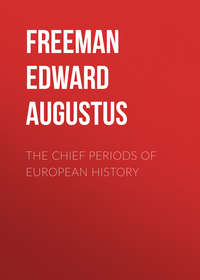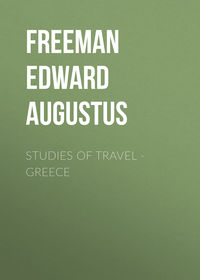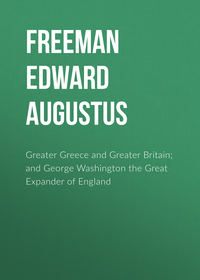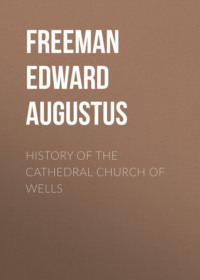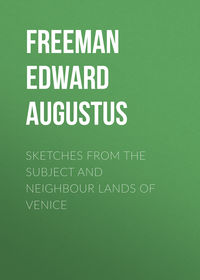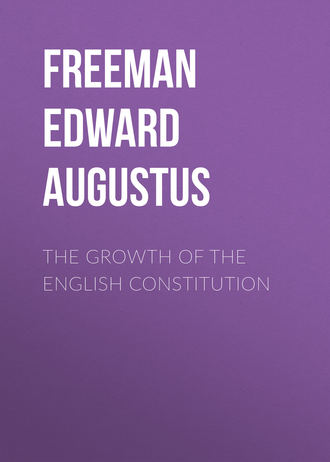 полная версия
полная версияThe Growth of the English Constitution
Thus we find the beginnings of the House of Commons, as we might have expected, in that class of its members which, for the most part, has most in common with the already established House of Lords. Thus far the developement of the Constitution had gone on in its usual incidental way. Each step in advance, however slight, was doubtless the work of the discernment of some particular man, even though his views may not have gone beyond the compassing of some momentary advantage. But now we come to that great change, that great measure of Parliamentary Reform, which has left to all later reformers nothing to do but to improve in detail. We come to that great act of the patriot Earl which made our popular Chamber really a popular Chamber. A House of knights, of county members, would have been comparatively an aristocratic body; it would have left out one of the most healthy and vigorous, and by far the most progressive, element in the nation. When, after the fight of Lewes, Earl Simon, then master of the kingdom with the King in his safe keeping, summoned his famous Parliament, he summoned, not only two knights from every county, but also two citizens from every city and two burgesses from every borough102. The Earl had long known the importance and value of the growing civic element in the political society of his age. When, in an earlier stage of his career, he held the government of Gascony, he had, on his return to England, to answer charges brought against him by the Archbishop of Bourdeaux and the nobles of the province. The Earl’s answer was to bring forward a writing, giving him the best of characters, which was signed with the common seal of the city of Bourdeaux103. As it was in Gascony, so it was in England. The Earl was always a reformer, one who set himself to redress practical grievances, to withstand the royal favourites, to put a check on the oppressions of Pope and King. But his first steps in the way of reform were made wholly on an aristocratic basis. He tried to redress the grievances of the nation by the help of his fellow nobles only. Step by step he learned that no true reform could be wrought for so narrow a platform, and step by step he took into his confidence, first the knights of the counties, and lastly the class to whose good will he had owed so much in his earlier trial, the citizens and burgesses. Through the whole struggle they stood steadily by him; London was as firm in his cause as Bourdeaux had been, and its citizens fought and suffered and triumphed with him on the glorious day of Lewes104. By a bold and happy innovation, he called a class which had done so much for him and for the common cause to take their place in the councils of the nation. It was in Earl Simon’s Parliament of 1265 that the still abiding elements of the popular chamber, the Knights, Citizens, and Burgesses, first appeared side by side. Thus was formed that newly developed Estate of the Realm which was, step by step, to grow into the most powerful of all, the Commons’ House of Parliament.
Such was the gift which England received from her noblest champion and martyr. Nor should it sound strange in our ears that her champion and martyr was by birth a stranger. We boast ourselves that we have led captive our conquerors, and that we have made them into sons of the soil as faithful as ourselves. What we have done with conquerors we have also done with peaceful settlers. In after days we welcomed every victim of oppression and persecution, the Fleming, the Huguenot, and the Palatine. And what we welcomed we adopted and assimilated, and strengthened our English being with all that was worthiest in foreign lands. So can we honour, along with the men of English birth, those men of other lands who have done for England as sons for their own mother. The Danish Cnut ranks alongside of the worthiest of our native Kings. Anselm of Aosta ranks alongside of the worthiest of our native Prelates. And so alongside of the worthiest of our native Earls we place the glorious name of Simon the Righteous. A stranger, but a stranger who came to our shores to claim lands and honours which were his lawful heritage, he became our leader against strangers of another mould, against the adventurers who thronged the court of a King who turned his back on his own people. The first noble of England, the brother-in-law of the King, he threw in his lot, not with princes or nobles, but with the whole people. He was the chosen leader of England in his life, and in death he was worshipped as her martyr. In those days religion coloured every feeling; the patriot who stood up for right and freedom was honoured alongside of him who suffered for his faith. We fill our streets and market-places with the statues of worthies of later days; Peel and Herbert and Lewis and Cobden yet live among us in bronze or marble. In those days honour to the statesman was not well distinguished from worship to the saint, and Waltheof and Simon and Thomas of Lancaster105 were hailed as sainted patrons of England, and wonders were held to be wrought by their relics or at their tombs. The poets of three languages vied in singing the praises of the man who strove and suffered for right, and Simon, the guardian of England on the field and in the senate, was held to be her truer guardian still in the heavenly places from which our fathers deemed that the curse of Rome had no power to shut him out106.
The great work of the martyred Earl had a strange destiny. His personal career was cut short, his political work was brought to perfection, by a rival and a kinsman only less to be honoured than himself. On the field of Evesham Simon died and Edward triumphed. But it was on Edward that Simon’s mantle fell; it was to his destroyer that he handed on the torch which fell from his dying grasp. For a moment his work seemed to have died with him; for some years Parliaments were still summoned which were not after the model of the great Assembly which answered to the writs of the captive Henry. But the model still lived in men’s hearts, and presently the wisdom of the great Edward saw that his uncle’s gift could no longer be denied to his people. Parliaments after Simon’s model have been called together in unbroken succession from Edward’s day to our own107. Next to the name of Simon we may honour the name of Edward himself and the names of the worthies who withstood him. To Roger Bigod of Norfolk and Humfrey Bohun of Hereford we owe the crowning of the work108. The Parliament of England was now wrought into the fulness of its perfect form, and the most homely, but not the least important, of its powers was now fully acknowledged. No tax or gift could the King of England claim at the hands of Englishmen save such as the Lords and Commons of England had granted him of their free will109.
Thus we may say that, in the time of Edward the First, the English Constitution definitely put on the same essential form which it has kept ever since. The germs of King, Lords, and Commons we had brought with us from our older home eight hundred years before. But, from King Edward’s days onwards, we have King, Lords, and Commons themselves, in nearly the same outward shape, with nearly the same strictly legal powers, which they still keep. All the great principles of English freedom were already firmly established. There is indeed a wide difference between the political condition of England under Edward the First and the political condition of England in our own day. But the difference lies far more in the practical working of the Constitution than in its outward form. The changes have been many; but a large portion of those changes have not been formal enactments, but those silent changes whose gradual working has wrought out for us a conventional Constitution existing alongside of our written Law. Other changes have been simply improvements in detail; others have been enactments made to declare more clearly, or to secure more fully in practice, those rights whose existence was not denied. But, speaking generally, and allowing for the important class of conventional understandings which have never been clothed with the form of written enactments, the main elements of the English Constitution remain now as they were fixed then. From that time English constitutional history is not merely an inquiry, however interesting and instructive, into something which has passed away. It is an inquiry into something which still lives; it is an inquiry into laws which, whenever they have not been formally repealed, are in full force at this day. Up to the reign of Edward the First English history is strictly the domain of antiquaries. From the reign of Edward the First it becomes the domain of lawyers110.
We find then – it will be understood with what qualifications I am speaking – the English Constitution fully grown by the end of the thirteenth century, and we find it to be, in the shape which it then took, the work of Earl Simon of Montfort and of King Edward the First. Now there are several points in which the shape which our Constitution thus finally took differed from the shapes which were taken by most of the kindred Constitutions on the Continent. The usual form taken by a national or provincial assembly in the middle ages was that of an Assembly of Estates. That is to say, it consisted of representatives of all those classes in the nation which were possessed of political rights. These in most countries were three, Nobles, Clergy, and Commons. And the name of the Three Estates, that is the Nobles, Clergy, and Commons, is equally well known in England, though the meaning of the three names differs not a little in England from what it meant elsewhere. In England we never had, unless it were in the old days of the Eorlas, a Nobility such as is understood by that name in other countries. Elsewhere the nobles formed a distinct class, a class into which it was perhaps not absolutely impossible for those who were beneath it to be raised, but from which it was at least absolutely impossible for any of its members to come down. Whatever the privileges of the noble might be, they extended to all his children and their children for ever and ever. In some countries his titles descend in this way to all his descendants; all the children of a Duke, for instance, are Dukes and Duchesses. In France, and in most other countries where the system of Estates existed, the Estate of the Nobles in the National Assembly was a representation, in some shape or other, of the whole class of nobles as a distinct body. How different this is from our House of Lords I need not point out. In strictness, I repeat, we have no nobility. The seats in our Upper Chamber go by descent and not by election or nomination; but no political privilege attaches to the children of their holders. Even the eldest son of the peer, the future holder of the peerage, is a commoner as long as his father lives. Whatever titles he bears are simply titles of courtesy which carry with them no political privileges above other commoners. Nay, we may go higher still. As the children of the peer have no special advantage, so neither have the younger children of the King himself. The King’s wife, his eldest son, his eldest daughter, his eldest son’s wife, all have special privileges by Law. His other children are simple commoners, unless their father thinks good to raise them, as he may raise any other of his subjects, to the rank of peerage111. There is perhaps no feature in our Constitution more important and more beneficial than this, which binds all ranks together, and which has hindered us from suffering at any time under the curse of a noble caste. Yet this marked distinction between our own Constitution and that of most other countries is purely traditional. We cannot say that it was enacted by any particular man or in any particular Assembly. But it is easy to see that the fact that in England our national Assemblies always went on in some shape or other, that the right of all freemen to attend in person was never formally abolished, that the King kept the right of specially summoning whom he would, all helped to hinder the growth of an exclusive noble caste. The aristocratic sentiment, the pride of birth, has doubtless been very strong at all times. But it has been merely a sentiment, resting on no legal foundation. The Crown could always ennoble any one; but the nobility so granted belonged to one only of the family at the time, to the actual owner of the peerage. All ranks could at all times freely intermarry; all offices were open to all freemen; and England, unlike Germany, never saw ecclesiastical foundations whose members were bound to be of noble birth.
The position of the Estate of the Clergy was also widely different in England from what it was in other countries. In fact the political position of the Clergy has, ever since Edward the First, been something utterly anomalous and inconsistent. Elsewhere the representatives of the Clergy, just like those of the Nobles, formed one distinct Estate in the Assembly. In England the great Prelates had seats in the House of Lords, where the Bishops keep them still. But there also existed the anomalous body called Convocation, whose character has always fluctuated between that of an ecclesiastical Synod and that of a parliamentary Estate of the realm112. The Clergy are still summoned along with every Parliament; and one distinctly parliamentary function they held down to the reign of Charles the Second, which was then taken away without any formal enactment. It was one of our great constitutional principles established in King Edward’s days that no tax could be granted to the King except by those who had to pay it. But for a long time the Lords and the Commons taxed themselves separately, and the Clergy in their Convocation taxed themselves separately also. And, till this power was given up, an ecclesiastical benefice gave no right to vote in the election of members of the House of Commons113.
The Commons too themselves bear a name which had a far different meaning in England from what it bore elsewhere. The usage by which the Knights of the shire and the Citizens and Burgesses were brought together in a single House, whatever was its origin, whether it were at first the result of design or of happy accident, has been an usage no less wholesome, no less needful to our full constitutional developement, than that which decreed that the children of peers should be commoners. In most other countries the class of men who were returned as representatives of the counties, the Knights of the Shire, would have been members of the Estate of the Nobles. In France the words nobleman and gentleman had the same meaning, that of the members of an exclusive aristocratic caste. The Commons, the Third Estate, consisted of the citizens of the privileged towns only114. But in England the middle class was not confined to the towns; it spread itself, in the form of a lesser gentry and a wealthy yeomanry, over the whole face of the land. That class, the smaller landowners, was for a long time the strength of the country, and the happiest results came from the union of their representatives in a single chamber with those of the cities and boroughs. Each class gained strength from its fellowship with the other, and the citizen class gained, from their union on equal terms with the landed gentry, a consideration which otherwise they might never have reached. In short, the union of the two, the union of all classes of freemen except the clergy and the actual members of the peerage, of all classes from the peer’s eldest son to the smallest freeholder or burgess, made the House of Commons a real representation of the whole nation, and not of any single order in the nation.
Mark again that the form of government which political writers call bi-cameral, that is to say, where the Legislative Assembly consists of two Chambers or Houses, arose out of one of the accidents of English History. The merits of that form of government are now freely under discussion, but it is assumed on both sides that the only choice lies between one chamber and two; no one proposes to have three or four115. But most of the continental bodies of Estates consisted, as we have seen, of three Houses; in Sweden, where the peasants, the small freeholders, were important enough to be separately represented alongside of the Nobles, Clergy, and Citizens, there were till lately four116. The number two became the number of our Houses of Parliament, not out of any conviction of the advantages of that number, but because it was found impossible to get the Clergy in England habitually to act, as they did elsewhere, as a regular member of the parliamentary body. They shrank from the burthen, or they deemed secular legislation inconsistent with their profession. Thus, instead of the Clergy forming, as they did in France, a distinct Estate of the Legislature, we got a Parliament of two Houses, Lords and Commons, attended by a kind of ecclesiastical shadow of the Parliament in the shape of the two Houses of the ecclesiastical Convocation. Thus, for all practical purposes, there were only two Estates in the English Parliament, Lords and Commons. Thus the phrase of the Three Estates, which had a meaning in France, became meaningless in England. For centuries back there has been no separate Estate of the Clergy; some of their highest members have belonged to the Estate of the Lords, and the rest to the Estate of the Commons. Hence has arisen a common but not unnatural misconception, a misconception as old as the days of the Long Parliament, as to the meaning of the phrase of the Three Estates. Men constantly use those words as if they meant the three elements among which the legislative power is divided, King, Lords, and Commons. But an Estate means a rank or order or class of men, like the Lords, the Clergy, or the Commons. The King is not an Estate, because there is no class or order of Kings, the King being one person alone by himself. The proper phrase is the King and the three Estates of the Realm. But in England, as I have already shown, the phrase is meaningless, as we have in truth two Estates only117.
We thus had in England, not an Estate of Nobles, forming a distinct class from the people, but an Upper House of hereditary and official Lords, whose privileges were purely personal, and whose children had no political privilege above other men. Our Bishops and some other of our ecclesiastical dignitaries had seats in the Upper House, but there was no distinct Estate of the Clergy, having its distinct voice in legislation. Our Lower House, lower in name, but gradually to become upper in real power, came to represent, not merely the inhabitants of privileged towns, but the whole nation, with the single exception of the personal holders of hereditary or official seats in the Upper House. That such an Assembly should gradually draw to itself all the real powers of the state was in the nature of things; but it was only gradually that it did so. Few things in our parliamentary history are more remarkable than the way in which the two Houses have for the most part worked together. I am not talking of very modern times, but of times when the two Houses were really coordinate powers in the state. During the six hundred years that the two Houses have lived side by side, serious disputes between them have been very rare, and those disputes which have happened have generally had to do with matters of form and privilege which were chiefly interesting to members of the two Houses themselves, not with questions which had any great importance for the nation at large118. For a while the Commons followed the lead of the Lords; then the Lords came gradually to follow the lead of the Commons; but open and violent breaches between the Houses have been rare indeed. From the days of Earl Simon onwards, both the power of Parliament as a whole, and the special power of the House of Commons, was constantly growing. The Parliaments of the fourteenth century exercised all the powers which our Parliament exercises now, together with some which modern Parliaments shrink from exercising. That is to say, the Parliaments of those days were obliged either to do directly or to leave undone many things which the developement of political conventionality enables a modern Parliament to do indirectly. The ancient Parliaments demanded the dismissal of the King’s ministers; they regulated his personal household; they put his authority into commission; if need called for such a step, they put forth their last and greatest power and deposed him from his kingly office. In those days a change of government, a change of policy, the getting rid of a bad minister and the putting a better in his place, were things which never could be done without an open struggle between King and Parliament; often they could not be done without the bondage, the imprisonment, or the death, perhaps only of the minister, perhaps even of the King himself. The same ends can now be gained by a vote of censure in the House of Commons; in many cases they can be gained even without a vote of censure, by the simple throwing out of a measure by which a Ministry has given out that it will stand or fall119.
The fifteenth century, as compared with the thirteenth and fourteenth, was in some respects a time in which things went back. It is plain that the Parliaments of that day were bodies which were much less independent than the Parliaments of earlier times. During the Wars of the Roses each successive military victor found a Parliament ready to confirm his claim to the Crown and to decree the condemnation of his enemies120. And it was a Parliament of Henry the Sixth which passed the most reactionary measure which any Parliament ever did pass, that by which the qualification for a county elector was narrowed to those freeholders whose estates were of the yearly value of forty shillings121. In this case time and the change in the value of money have redressed the wrong; there may be freeholders whose estates are under the value of forty shillings, but I cannot think that they are now a very large or important class. But, to understand the meaning of the restriction in the fifteenth century, for forty shillings we may fairly read forty pounds; and certainly, if we struck off the register all those electors whose qualification is a freehold – much more those whose qualification is an estate less than a freehold – under the value of forty pounds, the lessening of the constituencies of our counties would not be small. On the other hand, during the revolutionary times which followed, we more than once hear of direct appeals to the people which remind us of days far earlier. Edward the Fourth and Richard the Third were chosen Kings, or at least had their claims to the Crown acknowledged, by gatherings of the citizens of London which remind us of the wars of Stephen and Matilda122. Still even in this age, the power of Parliament was advancing123; the anxiety of every pretender to get a parliamentary sanction for his claims was a sign of the growing importance of Parliament, and we get incidental notices which show that a seat in the House of Commons, and that not as a knight of a shire, but as a burgess of a borough, was now an object of ambition for men of the class from which knights of the shire were chosen, and even for the sons of members of the Upper House124.
At last came the sixteenth century, the time of trial for parliamentary institutions in so many countries of Europe. Not a few assemblies which had once been as free as our own Parliament were, during that age, either utterly swept away or reduced to empty formalities. Then it was that Charles the Fifth and Philip the Second overthrew the free constitutions of Castile and Aragon; before long the States-General of France met for the last time before their last meeting of all on the eve of the great Revolution125. In England parliamentary institutions were not swept away, nor did Parliament sink into an empty form. But, for a while, Parliaments, like all our other institutions, became perverted into instruments of tyranny. Under Henry the Eighth, Parliaments, like Judges, Juries, and ecclesiastical Synods, decreed whatever seemed good to the caprice of the despot. Why had they so fallen away from what they had been in a past age, from what they were to be again? The reason is plain; the Commons had not yet gained strength enough to act without the Lords, and the Lords had ceased to be an independent body. The old nobility had been cut off at Towton and Barnet, and the new nobility were the abject slaves of the King to whom they owed their honours. A century later, the new nobility had inherited the spirit of the old, and the Commons had grown to the fulness of their power. Thus it came that we find in the Parliaments of the sixteenth century an abject submission to a tyrant’s will, of which we find no sign in the Parliaments either of the fourteenth or of the seventeenth. Very different indeed from the Parliaments which overthrew Richard the Second and Charles the First were the Parliaments which, almost without a question, passed bills of attainder against any man against whom Henry’s caprice had turned, the Parliaments which, in the great age of religious controversy, were ever ready to enforce by every penalty that particular shade of doctrine which for the moment commended itself to the Defender of the Faith, to his son or to his daughters. Why, it may be asked, in such a state of things, did not parliamentary institutions perish in England as they perished in so many other lands? It might be enough to say that no ruler had an interest in destroying institutions which he found that he could so conveniently turn to his own purposes. But why did not those institutions sink into mere forms, which they certainly did not do, even in the worst times? One reason undoubtedly is that special insular position of our country which has in so many other ways given a peculiar turn to our history. The great foe of parliamentary institutions was the introduction of standing armies. But the sovereign of England, shut up within his island, had far less need of a standing army than the sovereigns of the Continent, engaged as they were in their ceaseless wars with neighbours on their frontiers. But I believe that the personal character of Henry the Eighth had a great deal to do with the final preservation of our liberties. Do not for a moment fancy that I belong to that school of paradox which sets up Henry the Eighth as a virtuous and beneficent ruler. Do not think that I claim for him any feelings of direct thankfulness such as I do claim for Earl Simon and King Edward. The position of Henry is more like the position of William the Conqueror, though I certainly hold that the Conqueror was in everything the better man of the two. Both served the cause of freedom indirectly, and both served it by means of features in the personal character of each. In one respect indeed William and Henry stood in utterly different positions towards England. William was a stranger, and it was largely because he was a stranger that he was able to do us indirect good. Henry, with all his crimes, was a thorough Englishman; throughout his reign there was a sympathy between him and the mass of his subjects, who, after all, did not greatly suffer by the occasional beheading of a Queen or a Duke. But the despotism of William and the despotism of Henry agreed in this, that each, even in his worst deeds, retained a scrupulous regard for the letter of the Law. In the case of William this is not hard to see for any one who carefully studies the records of his age126; in the case of Henry it stands boldly proclaimed in the broadest facts of English history. While his fellow-tyrants abroad were everywhere overthrowing free institutions, Henry was in all things showing them the deepest outward respect. Throughout his reign he took care to do nothing except in outward and regular legal form, nothing for which he could not shelter himself under the sanction either of precedent or of written Law. In itself, this perversion of Law, this clothing of wrong with the garb of right, is really worse – at all events it is more corrupting – than deeds of open violence against which men are tempted openly to revolt. But such a tyranny as Henry’s is one form of the homage which vice pays to virtue; the careful preservation of the outward forms of freedom makes it easier for another and happier generation again to kindle the form into its ancient spirit and life. Every deed of wrong done by Henry with the assent of Parliament was in truth a witness to the abiding importance of Parliament; the very degradation of our ancient Constitution was a step to its revival with new strength and in a more perfect form127.


